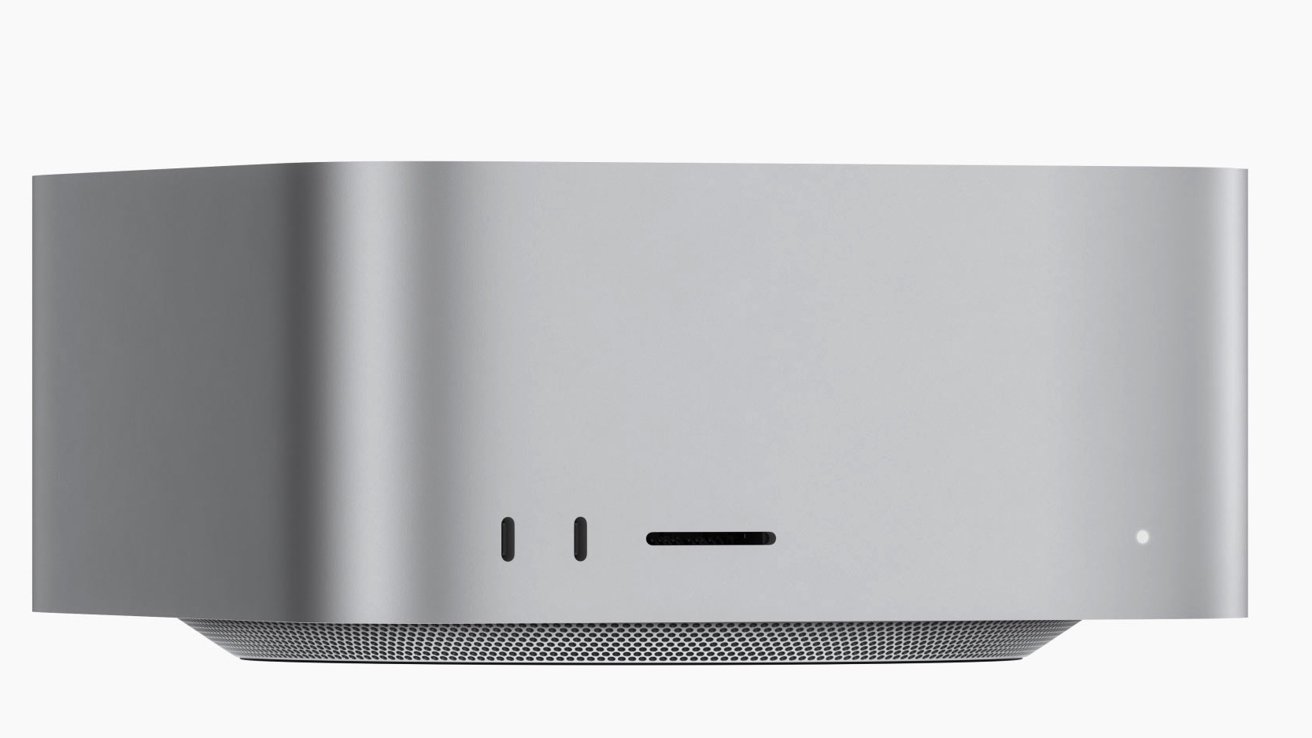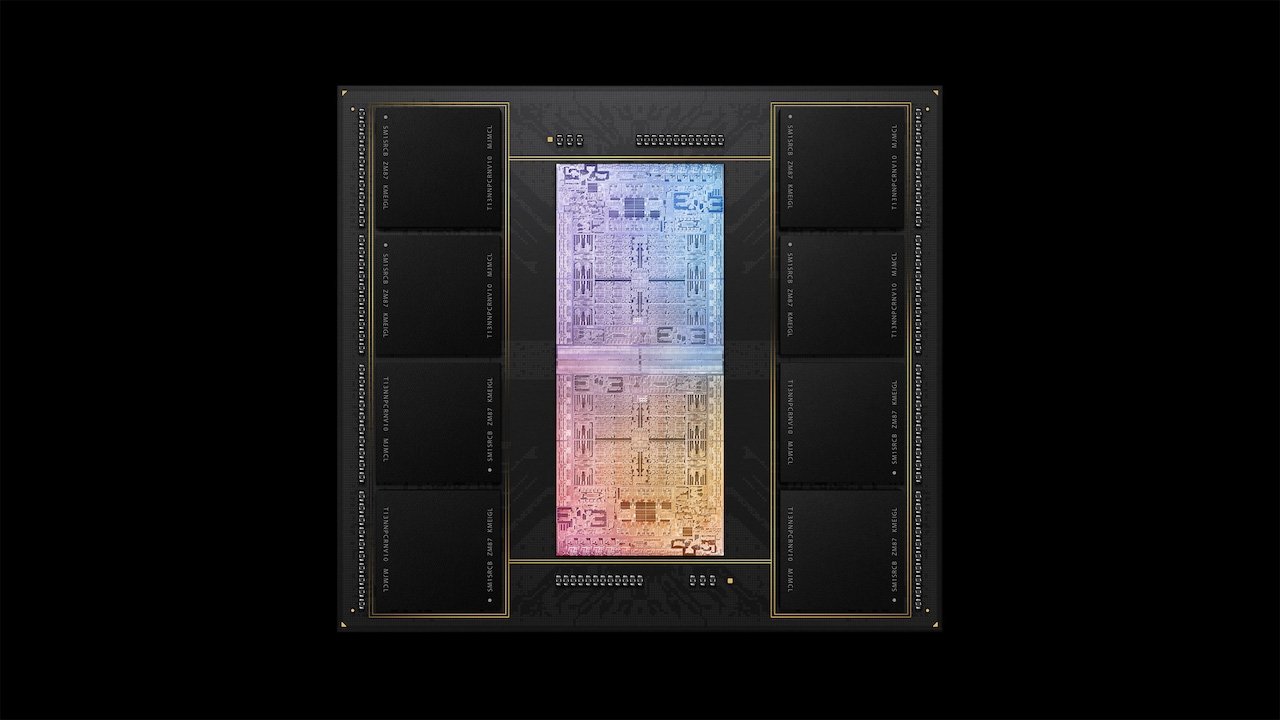Leaked M1 Ultra Mac Studio benchmarks prove it outclasses top Mac Pro
Benchmark results for Apple's recently announced M1 Ultra chip have surfaced, revealing just how significant the performance gains in the Mac Studio are versus the highest-end Mac Pro and MacBook Pro with M1 Max processor.

The benchmark results were published at around 4 p.m. Eastern on Monday, a few hours after Apple's "Peek Performance" event. During the event, Apple unveiled its new M1 Ultra chip, which essentially combines two M1 Max chips in a single package.
Apple's M1 Ultra chip achieved a 1,793 score in single-core Geekbench 5 testing and a 24,055 score in multi-core score testing.
A source inside Apple not authorized to speak on behalf of the company confirmed to AppleInsider that the benchmarks are indeed authentic.
For comparison, Apple's Mac Pro with a 28-core Intel Xeon W scored an average of 1,152 in single-core Geekbench 5 testing and a multi-core score of 19,951.

Apple's M1 Ultra chipset
What that means, essentially, is that the M1 Ultra is 21% faster than the top-tier Mac Pro with an Intel chip in multi-core performance. When it comes to single-core performance, M1 Ultra is 56% faster, which is in-line with Apple's own claimed benchmarks.
The M1 Max, which is currently available in Apple's MacBook Pro, achieved a single-core score of 1,739 and a multi-core score of 11,680 in the same Geekbench testing. While the single-core scores are roughly comparable, the M1 Ultra's multi-core scores are 105% higher than the M1 Max.
Apple's new Mac Studio starts at $3,999 for a model with an M1 Ultra chip. It's currently available to preorder starting March 8 and in theory, will ship out to customers on Friday, March 18. However, orders are already seeing delays into April and May for some configurations.
Read on AppleInsider

The benchmark results were published at around 4 p.m. Eastern on Monday, a few hours after Apple's "Peek Performance" event. During the event, Apple unveiled its new M1 Ultra chip, which essentially combines two M1 Max chips in a single package.
Apple's M1 Ultra chip achieved a 1,793 score in single-core Geekbench 5 testing and a 24,055 score in multi-core score testing.
A source inside Apple not authorized to speak on behalf of the company confirmed to AppleInsider that the benchmarks are indeed authentic.
For comparison, Apple's Mac Pro with a 28-core Intel Xeon W scored an average of 1,152 in single-core Geekbench 5 testing and a multi-core score of 19,951.

Apple's M1 Ultra chipset
What that means, essentially, is that the M1 Ultra is 21% faster than the top-tier Mac Pro with an Intel chip in multi-core performance. When it comes to single-core performance, M1 Ultra is 56% faster, which is in-line with Apple's own claimed benchmarks.
The M1 Max, which is currently available in Apple's MacBook Pro, achieved a single-core score of 1,739 and a multi-core score of 11,680 in the same Geekbench testing. While the single-core scores are roughly comparable, the M1 Ultra's multi-core scores are 105% higher than the M1 Max.
Apple's new Mac Studio starts at $3,999 for a model with an M1 Ultra chip. It's currently available to preorder starting March 8 and in theory, will ship out to customers on Friday, March 18. However, orders are already seeing delays into April and May for some configurations.
Read on AppleInsider

Comments
If not, this sentiment is irrelevant. There is also something faster in development.
i’m using the 16” Macbook Pro with 32 graphics cores and 64GB RAM now, so I’m really interested to find out how close to a doubling in performances I’ll see with this. Double the rendering engines as well. That should prove interesting.
I'm a bit disappointed in the monitor though. I was hoping for a model that was somewhat more expensive, with miniLED, and possibly even 6K, as I’m hoping the new higher end monitor expected to come out will also use MiniLED, an advance over what it has now, and possibly go to 8K, though now I’m reading something about 7k, which is an odd resolution. But I bought this new one anyway. From what I’m reading, it should be somewhat better than the present iMac versions.
https://technical.city/en/cpu/Xeon-W-3275M-vs-Xeon-Platinum-8380
https://www.cpu-monkey.com/en/compare_cpu-intel_xeon_w_3275-1160-vs-amd_epyc_7763-1908
Why should I pay for something to heat my home, when I don’t have to? Why should I work beside a computer that makes a ton of noise?
Sure, I want the computer that’s the best “value”. Price, speed, noise, heat and portability are parts of the calculus I use to determine what I buy.
I bought the MacBook Air with silicon. I installed a thermal pad on the CPU and now I get performance equivalent to the MacBook Pro 13”. Boom!
Maybe you just care about performance and price? Good for u.
👍
Obiwanbill
If you want to rack mount these, they won't fit in the current 19" rack assemblies but I'm sure these will be available very soon. Turning them on their side lets you put five in a 3 or 4U rack. That's 15A/120V per shelf. A rack of these could use a much lower kVA UPS than the old Intel Mac minis. I wish I was still working, I would have ordered several right away.
But let's also not forget the cores in the Ultra are 18 months old now, first released in the Fall 2020, in the A14, so I'd say it is a fairly valid comparison. Especially when also considering the price of Xeons... that 28-core is a $7,000US upgrade option. The CPU/GPU cores in the upcoming A16 should have a notable increase in both performance and efficiency. I'm thinking once the transition is done, Apple will move towards amore steady upgrade cycle for all their SoC's. With the base variant (M1, M2, M3) on a yearly update alongside the A-series, and the "X" variant (Pro, Max, Ultra) updated every two years, jumping a generation each time for added perceived performance.
I'd also like to point out that on the GB5 CPU chart there is currently only 1 CPU that scored higher than the Ultra in multi-core performance... a 64-core AMD Threadripper that runs at a whopping 280W TDP, and above 350W in full "Boost" mode. Meanwhile the CPU in the Ultra tops out at 60W. One other thing of note with the Ultra is the linear CPU performance increase with each new core which is unheard of. Imagine if Apple released a discrete CPU with 64 cores!? Running at under 200W with scores well above 50,000 on GB5. Maybe this is the route Apple goes with the Mac Pro? After all, if the Ultra is the last SoC in the M1 family, maybe Apple created something unique for the Pro?
It's also fair to state that Apple is delivering a working computer, in various levels, not just a CPU, so unquestionably excellent bang for the buck with the M1 Ultra.
The 32 core Threadripper has a score of 22,314; the 64 Core version has a multicore score of 25,133.
Those Threadrippers have TDP of nearly 300 watts. They cost about $2500 and $7000, respectively (at NewEgg).
Some thoughts:
1. Holy crap.
2. x86 chips have to throttle their clock speeds A LOT when they go from single to multi core. So their high single thread scores don't scale well at all.
3. AMD's design uses 8 chiplets for the 64 core version, which could also help explain why multicore scores don't scale well
4. Meanwhile, I'll bet the Ultra maintains the same clock speed regardless of 1 thread or 20 AND I'll bet the monster bandwidth of these chips facilitates excellent scaling
5. Holy crap. Holy crap. Holy crap.
I just don’t see the need if they keep updating this machine to M2, M3 Max/Ultra equivalents. I can imagine a SoC isn’t ideal because if one thing breaks, the entire machine breaks, but if you break up the components into modular parts you’d lose the benefits of Apple Silicon.